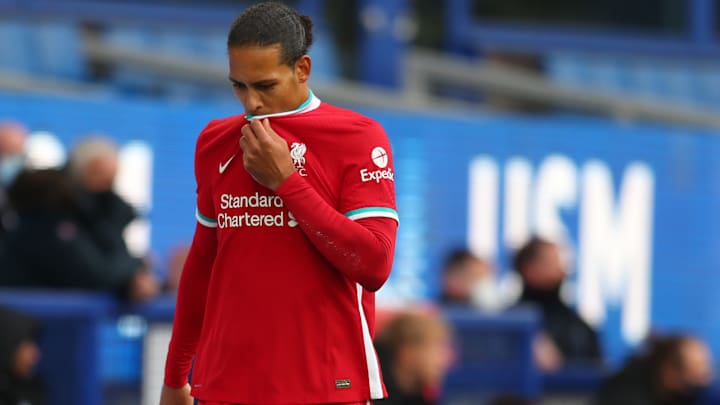Liverpool's Outlook Considerably Bleaker After van Dijk's Long-Term Injury

Even at full time on Saturday, as rumors about the severity of Virgil van Dijk’s knee injury began to circulate, it felt that the most serious consequence of the game may not be the two points Liverpool dropped, but the loss of its best defender. Confirmation on Sunday that van Dijk will require surgery and as a result miss several months, and perhaps the rest of the season, means Liverpool’s hopes of retaining the title are severely reduced.
Manchester City last season lacked leadership after the departure of Vincent Kompany, a problem compounded when Aymeric Laporte suffered a serious knee injury, depriving the club of its best defender as well. Van Dijk is both: a calming and authoritative presence at the back who is also possessed of the extraordinary range of attributes necessary for a modern center back, a fine reader of the game and a fine passer, but also good in the air and the tackle. He is the player Liverpool could least afford to lose, not only for what he represents but also for the lack of available cover.
With Dejan Lovren gone to Zenit Saint Petersburg in the summer, the only two recognized senior central defenders are Joël Matip and Joe Gomez, both of whom have a history of regular injury problems. Not only that, but both are right-footed and prefer to operate on the right of the central defensive pairing, something that is less an issue defensively than it is for playing out from the back. It may be that Fabinho can drop back to operate as a central defender, as he has at various times in the past, but he is inexperienced in the role.
The timing for Liverpool couldn’t really have been worse, coming just after the transfer window closed and at a time when starting goalkeeper Alisson is also out. It was the arrival of van Dijk and Allison in 2018 that transformed Liverpool defensively from a team that always seemed vulnerable into the solid unit that won the title last season and the Champions League the season before. Over the past two seasons, Liverpool has won 75% of the games Van Dijk has started and only 40% of those he has not. It’s perhaps understandable that Liverpool supporters have reacted with such fury, both against Jordan Pickford, the Everton goalkeeper whose wild lunge caused the injury, and David Coote, the VAR official who decided not to advise on-field referee Michael Oliver that there may be a case of serious foul play to answer, but that doesn’t excuse the extreme nature of the sequence.
That it should have been a red card and a three-game ban is widely agreed, given that Pickford endangered an opponent, but this was surely a case of recklessness rather than malice. Social media and the tribalism of the modern game perhaps lend themselves to such a reaction, and there was something similar from Arsenal fans after the Ryan Shawcross foul that broke Aaron Ramsey’s leg. But there is a danger if the club allows itself to be drawn into a similar line of thought—and in that context the official complaint about Saturday’s VAR decisions is troubling.
Opposing players do sometimes commit dangerous fouls. Referees, even those watching on a screen, do sometimes get things wrong. To suggest there is anything more to it than that can help foster a siege mentality, that generator of enhanced motivation by which Sir Alex Ferguson once swore, but it can also lead to the sort of hysteria that undermined Brazil after Neymar’s injury at the 2014 World Cup.
After the 3–1 win over Arsenal, there was a fascinating moment of friction between Jürgen Klopp and Roy Keane, who as a TV pundit had suggested Liverpool had been “sloppy.” Klopp essentially argued that his style necessarily entailed a level of risk—which does seem a defining feature of the modern game among those sides who operate with a high line. The following week, Liverpool let in seven, and the defensive frailties were apparent again in the 2-2 draw against Everton.
Without Van Dijk (and Alisson), there is going to be an even greater likelihood of Liverpool being exposed. After the Villa defeat, there was probably a need for a reset some kind of retrenchment to restore a level of solidity, to reduce the risk a little. That process has become a lot harder now.

An accomplished author of multiple books, Jonathan Wilson is one of the world’s preeminent minds on soccer tactics and history.